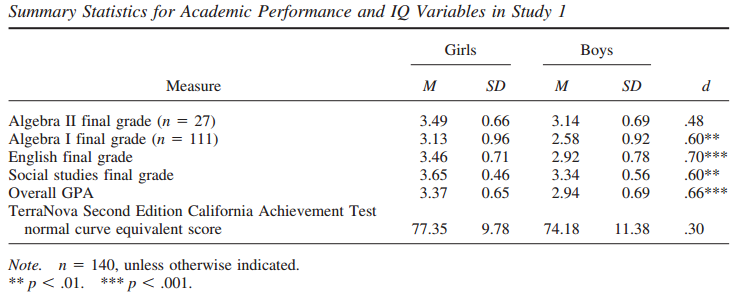There might be affiliate links on this page, which means we get a small commission of anything you buy. As an Amazon Associate we earn from qualifying purchases. Please do your own research before making any online purchase.
Do girls achieve better than boys when it comes to self-discipline, grades and achievement?
Using the same data as in this study, the idea that girls have higher average levels of self-discipline than boys were tested and confirmed.
Adolescent girls were found to have 5 to 20% more self-control than adolescent boys, explaining in part why they do better than boys in school. In this study, the women had, on average, a 14% higher GPA than the men.
Although this study raises the possibility that adolescent girls have more self-control than adolescent boys, many questions remain:
Is the difference biological, or environmental?
How long does the difference persist? Into adulthood? Or is this merely a case of girls maturing ahead of boys, suggesting that over time the gap should diminish?
If the difference is environmental, can the effects be transferred to boys?
Click here to learn more about self-control.
Study Details
Hypothesis: Women have more self-discipline than men, and this difference explains part of the reason why women have higher GPAs than men.
Method: Two cohorts of eight-grade students (n = 304) from a magnet school in a NE city were assessed at two periods – during the first semester of their academic year, and seven months later.
Measures: Several measures of self-discipline and one measure of IQ was compared against several measures of academic performance.
A self-control, impulsiveness, and discounting rate questionnaire and IQ test were given to the students. For the second cohort, a less theoretical test of self-control and discounting was given, the delay choice task.
Self-Control, observer-report questionnaire was given to both parents and homeroom teachers.
Academic performance was assessed using the following measures: the GPA of their first semester, their final GPA for the year seven months later, their score on a standardized achievement test (also several months later), their selection to a charter high-school, how many hours they spent doing homework and watching TV, how often they were absent, and the time of day they began doing their homework.
Results: The hypothesis was partially confirmed.
As expected, women had higher GPAs and greater self-discipline than men. A mediation analyses suggested that the gender differences in self-discipline partially explained the female advantage in GPA.
Concerns: The effect sizes were statistically significant but still small (e.g. the mean difference between female and male scores was less than 10%). The sample size was small.
Questions: Why did women have greater self-control? Why doesn't the higher GPA average among females translate into increased performance on standardized tests and income? After controlling for self-esteem, reduced competitive drive, societal pressures to raise a family, etc… would self-discipline predict increased income, or at least some other measure of increased job performance? Does the gender discrepancy in self-discipline persist into adulthood? At what point does increased self-discipline start to reach diminishing returns?
–>>Learn How to Increase your Happiness.<<—
Duckworth, A. L. & Seligman, M. E. P. (2006). Self-discipline gives girls the edge: Gender differences in self-discipline, grades, and achievement test scores. Journal of Educational Psychology, 98, 198-208.



